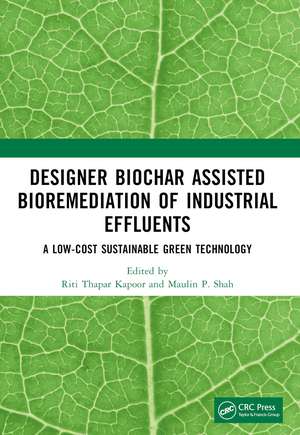Designer Biochar Assisted Bioremediation of Industrial Effluents: A Low-Cost Sustainable Green Technology
Editat de Riti Thapar Kapoor, Maulin P. Shahen Limba Engleză Paperback – 9 oct 2024
Features:
- Provides exhaustive coverage of biochar and its production and properties
- Highlights use of biochar in pollution control and environment protection
- Covers use of agricultural waste/waste biomass for dye decolorization and degradation
- Explores synergistic approaches for contaminants removal for better insights into basic and advanced biotechnological applications
- Describes how biochar treatment can be successfully applied for reuse of wastewater and contaminated soil ecorestoration and environment protection
| Toate formatele și edițiile | Preț | Express |
|---|---|---|
| Paperback (1) | 334.38 lei 6-8 săpt. | |
| CRC Press – 9 oct 2024 | 334.38 lei 6-8 săpt. | |
| Hardback (1) | 883.66 lei 6-8 săpt. | |
| CRC Press – 12 dec 2022 | 883.66 lei 6-8 săpt. |
Preț: 334.38 lei
Preț vechi: 380.76 lei
-12% Nou
Puncte Express: 502
Preț estimativ în valută:
63.100€ • 66.52$ • 53.01£
63.100€ • 66.52$ • 53.01£
Carte tipărită la comandă
Livrare economică 05-19 februarie 25
Preluare comenzi: 021 569.72.76
Specificații
ISBN-13: 9781032066967
ISBN-10: 1032066962
Pagini: 324
Ilustrații: 90
Dimensiuni: 178 x 254 mm
Greutate: 0.6 kg
Ediția:1
Editura: CRC Press
Colecția CRC Press
Locul publicării:Boca Raton, United States
ISBN-10: 1032066962
Pagini: 324
Ilustrații: 90
Dimensiuni: 178 x 254 mm
Greutate: 0.6 kg
Ediția:1
Editura: CRC Press
Colecția CRC Press
Locul publicării:Boca Raton, United States
Public țintă
AcademicCuprins
1 Recent Advances in Biochar Production and Its Applications toward Textile Industry Effluent Treatment; 2 Utilization of Modified Biochar for Wastewater Recycling and Management: An Overview; 3 Removal of Emerging Contaminants by Biochar: An Eco-friendly Approach for a Sustainable Environment; 4 Biochar for the Remediation of Heavy-Metal-Contaminated Soil: Present Scenario and Future Challenges; 5 Review on Biochar Production from Biomass and Its Applications in Removing Environmental Pollutants; 6 Modified Biochar for Wastewater Treatment and Reuse; 7 Utilization of Sustainable Biochar Approach to Improve Contaminated Agricultural Soils for Plant Growth Promotion; 8 Prospects of Biochar Technology for Clean Water Provision; 9 Biochar for Removal of Dyes from Industrial Effluents; 10 Efficacy of Biochar in Decontamination of Pesticides; 11 Application of Biochar in the Removal of Organic and Inorganic Contaminants from Wastewater: Mechanism, Operating Conditions, and Modifications; 12 Removal of Pharmaceutical Active Compounds (PhACs) from Wastewater by Designer Biochar; 13 Recent Advances in Dye Removal Technologies by Designer Biochar; 14 Restoration of Contaminated Agricultural Soils Using Modified Biochar; 15 Use of Biochar for the Remediation of Heavy-Metal-Contaminated Soil; 16 Treatment of Industrial Wastewater by Utilization of Biochar as a Green Technology; 17 Biochar Application for Treatment of Industrial Effluent as a Green Technology: Opportunities, Challenges, and Future Perspectives
Notă biografică
Riti Thapar Kapoor is Assistant Professor (Grade-III) in Amity Institute of Biotechnology, Amity University Uttar Pradesh, Noida, India. Dr. Kapoor received her PhD from the University of Allahabad and worked as postdoctoral fellow at Banaras Hindu University, Varanasi, India. Dr. Kapoor has 14 years of teaching and research experience, and her area of specialization is environmental biotechnology, bioremediation, and abiotic stresses. Dr. Kapoor is author of three books and editor of five books of international repute (Elsevier, Springer, DeGruyter, etc.). She has published over 80 research papers in various journals of national and international repute. Dr. Kapoor has visited eight countries for participation in different academic programs. Dr. Kapoor has received a prestigious travel award from Bill & Melinda Gates Research Foundation (CGIAR project) for participation in an international training program held at International Rice Research Institute (IRRI), Manila, Philippines in 2010. She is also recipient of a DST travel grant for participation in an International Conference held at Sri Lanka in 2013. Dr. Kapoor has been awarded a Teacher’s Research Fellowship from the Indian Academy of Sciences, Bengaluru, in 2019.
Maulin P. Shah is an active researcher and scientific writer in his field for over 20 years. He received a BSc degree (1999) in Microbiology from Gujarat University, Godhra (Gujarat), India. He also earned his PhD degree (2005) in Environmental Microbiology from Sardar Patel University, Vallabh Vidyanagar (Gujarat), India. His research interests include Biological Wastewater Treatment, Environmental Microbiology, Biodegradation, Bioremediation, and Phytoremediation of Environmental Pollutants from Industrial Wastewaters. He has published more than 250 research papers in national and international journals of repute on various aspects of microbial biodegradation and bioremediation of environmental pollutants. He is the editor of 90 books of international repute (RSC, Elsevier, Springer, DeGruyter, Wiley, and CRC Press).
Maulin P. Shah is an active researcher and scientific writer in his field for over 20 years. He received a BSc degree (1999) in Microbiology from Gujarat University, Godhra (Gujarat), India. He also earned his PhD degree (2005) in Environmental Microbiology from Sardar Patel University, Vallabh Vidyanagar (Gujarat), India. His research interests include Biological Wastewater Treatment, Environmental Microbiology, Biodegradation, Bioremediation, and Phytoremediation of Environmental Pollutants from Industrial Wastewaters. He has published more than 250 research papers in national and international journals of repute on various aspects of microbial biodegradation and bioremediation of environmental pollutants. He is the editor of 90 books of international repute (RSC, Elsevier, Springer, DeGruyter, Wiley, and CRC Press).
Descriere
This book provides useful information and applications of biochar produced from agricultural waste, for removal of contaminants from industrial effluent and reutilization of waste sludge in production of biofuel/bioenergy. It deals with the unique features, advantages and disadvantages of techniques for biochar production and analyses.
